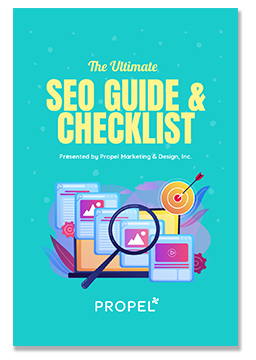Keyword research is one of the first steps in creating a successful SEO campaign. In this post, we’ll cover what keyword research is, why it’s important, how to make it work for you, and all those fundamentals that will kick your SEO campaign into high gear with keyword research insight.
Let’s get started, shall we…
What is Keyword Research?
Keyword research, simply stated, is learning the keywords that searchers are inputting, into the search engines, in order to find you, or your competitors.
So, how are the users looking for their information, what words are they using, what phrases are they using?
Understanding searcher intent can help guide you in this process of keyword discovery.
Your searcher’s intent (or user’s intent) is the reason or motive behind the searcher’s query. Why are they searching, is it for answers to a question, or maybe it’s to purchase something? Is it a specific query or a broad one?
Once you understand your users and how they’re looking for you (or your competition), you’ll have a good starting point when it comes to your keywords.
When you have the knowledge of the terms that are working for your business, it’s time to make them specific to your brand and you should optimize your content accordingly, this will give you the boost you’re looking for on the SERPs (Search Engine Results Pages).
Why is Keyword Research Important?
We all know how competitive it is out there in the WWW, so gaining the coveted spots on the top of Google (and the other search engines) will take more now than it has in years past. It’s become both an art and a science.
It’s not just about getting the organic traffic to your website, it’s about your user’s intent (see above), meaning once you know the whys and whats of the query you can make educated decisions regarding your keywords.
In order to achieve the follow-through you want, you need to dish out high-quality content. Meaning, you need to provide conscientious, reliable, and honest content to your users AT ALL TIMES. And this is why keyword research is of such great importance to you.
When you use the “right” keywords, you get the “right” audience. And Google, along with all the other search engines, takes notice of, and duly rewards, those who provide significant value to their users.
Performing keyword research gives you great insight into your target audience and will benefit you both, so it’s critical to have a keyword research strategy in play. Once it’s mastered you will get better visibility on the search engines which will increase your organic traffic tenfold.
What Are Keywords and Keyword Queries?
Okay, this may seem like a no duh moment, but stay with me, it gets a teensy bit techy.
Think of it like this: the search engine is the liaison between your content and what your user is searching, the keywords they’re using, a.k.a. their search query.
Keywords are the words searchers search in order to find what they want. It may be one word, it may be a phrase. There are three types:
- Short tail keyword: usually just one or two words, like: yoga pants. Not very specific, pretty generic and a huge search volume.
- Medium tail keyword: usually three or four words, like: yoga pants for children. This is a bit more specific with less search volume.
- Long tail keyword: usually four or more words, like: American made high quality yoga pants for children. This search has more detail and the search volume is at its lowest.
Don’t let the short tail keywords pull you in based on their search volume; however, the competition there is brutal. Getting specific with your brand will help you in the long run. When you create a medium and long tail keyword strategy, you automatically fulfill the short tail keyword quota, so you’ll rank for all three categories!
Now that you have the hang of the keyword categories, let’s discuss the three types of search queries your search will fall into.
According to a Penn State University study, we’ve got three types of search queries out there:
- Navigational (a “go” query): this is when your friend tells you about a super cool coffee shop that just opened and you type that name into the search bar in order to find their specific website.
- Informational (a “know” query): this is when you’re searching for an answer to something, such as: how do I change a tire or how do I take off gel nails (no seriously, if you know the answer to this leave it in a comment because these things will not come off).
- Transactional (a “do” query): this is when you’re ready to complete an action- a purchase or handing over your contact info, etc., and you’d ask the search engine something like: where can I get the best cupcakes at the cheapest price?
So, there you have it, the techiness is over and hopefully not too painful.
How Has Keyword Research Evolved?
Because the evolution of SEO is breathing and ongoing, it’s important to stay in the know with all of those changes. And yes, that counts for keyword research too.
It’s predicted that by the year 2020 50% of searches will be voice search. That’s right, I literally just asked Alexa “How do I make a frozen chicken pot pie taste like it’s homemade?” (Incidentally, it’s very drawn out, tinfoil is involved, you might as well just make it from scratch.)
So, what does this mean for your keyword research strategy? It means you have another way to reach your audience. And that’s great for you. You just have to know how to make that happen.
Little experiment for you: I want you to think about how you speak to Siri/Alexa,/Cortana. Now, think about how you type a query into your search bar. See the difference? You don’t say, “Siri, yoga pants” do you? Of course not. You ask her long-tail questions, “Siri, where can I find American made, high-quality yoga pants for children?” I mean, she’s a human being, not a robot (don’t forget to say please and thank you).
So, you need to be optimized for a more natural way of speaking. Remember that having relevant content is most important but figure out the natural language keywords that will help in your voice search optimization. This could set you apart from your competition.
How Do I Master Keyword Research on New or Existing Websites?
Yes, there is a significant difference in your keyword research strategy depending on whether you’re dealing with a brand-spankin’-newbie website or an oldie-but-goodie website.
Let’s Start with the New
When you’re looking to begin your keyword research for a new website, you’ve got nada to go on when it comes to testing, tools, metrics, etc. All you got is your intuition, baby. And it’s gotten you this far, so let’s go with it.
What’s the Keyword Research Process?
Like with many things in life, there’s a process to keyword research. So, for your keyword research strategy pleasure, here it is:
Think of general ideas/topics related to your business– what do you want to rank for? Come up with 5-10 topics while keeping in mind your buyer persona when creating this list
How to find keyword ideas– what keywords fall into these topic buckets? How would you search to find these topics? On Google, look at the “Searches related to FILL IN THE BLANK” area for more ideas
Keyword research tools– tools can help! There are free and paid tools all over the internet to aid and guide you through keyword research.
- Google Keyword Planner
- Answer the Public
- SEMrush
- Ahrefs Keyword Explorer
- Keyword Tool
- Google Trends
- Moz’s Keyword Explorer
- Keywords Everywhere
- Ubersuggest
- KWFinder
- Jaaxy
- SECockpit
- KWFinder
How to choose a keyword– do you have about infinity keywords to work with now? That may be too many. You can find tools to help, but start with the basics and ask yourself how your users will look for you. Then figure out your short, medium, or long tail keywords and start analyzing!
Make a list of keywords– this speaks for itself, sooo… make a list of the chosen keywords.
Synonyms and related keywords– you’ll want to optimize for synonyms and related keyphrases, you can’t be using the same keyword over and over again in your content, not only does this make for lazy and unreadable content, but the search engines don’t like it.
Singular or plural keyword?– google is one smart cookie. It knows that when you write about a keyword term like “bike” that it means the same as “bikes” and / or “bicycle,” but it’s still important to work in plural versions of your keyword, when and / if it feels right in the context of your copy.
Check volume and competition/keyword difficulty– when narrowing your list, use tools like Google’s Keyword Planner along with Google Trends to check the volume of each word. And to find out about your competition, you can either manually search their words, or use SEMrush for some tricks. You’ll find tools to help with your keyword difficulty, too- they’ll identify how much effort is needed to rank your keywords.
Organize keywords into topic groups– you made a list of bucket topics first and foremost, what bucket are your selected keywords going to go in?
Plan content development around keywords– now you can get creative! When you’re developing your content, first connect with your target, then go back over it and drop in your keywords where you can (if you didn’t already)- always remember, you’re writing first for user, second for search engine.
Related Searched, LSI, & User Intent– you’ll want to make sure you’ve reviewed and researched each of your keywords separately. Google it, look at the box that says “Searches related to FILL IN THE BLANK” (this list is the LSI: Latent Semantic Indexing), then note the “People also ask” section. Look over the top ten results and you’ll get an idea of user intent, take note of what’s missing on these sites and add those things to your site- now you get it!
Alignment with your web pages– when your users type in their query and are directed to you, your webpage needs to be on par with their expectations. Your user’s intent with their keywords should match your page’s intent to provide.
Brainstorming Keyword Ideas
I love me a good brainstorming sesh, solo or with the team. Think coffee, Chinese from the carton, afterhours (if you’re into that sort of workload). You have the picture painted, so get to the brainstorming part.
Think of the following list while starting to compile your keywords:
- Company name
- Products
- Services
- Solutions
- Industry terms
- Problems customers are looking to get solved
What do you think will be some excellent keywords for users to find you? After you’ve figured that out, Google ‘em. What comes up? Hopefully websites with offers similar to yours, with content that YOUR customer would find beneficial.
Check out the websites and look at their words, do you see any that would fit your brand, but you aren’t currently using? Snag those, if so.
The goal is to let your competitors do the work for you. And don’t feel bad about that. They’ve done it and they’ll do it again.
While you definitely want to use your competition for your keyword progression, you definitely don’t wanna stop there. It’s time to broaden and bolster that list so you can outrank them.
Once you’ve reviewed the websites that best fit your brand, get your thinking cap on and come up with more keywords to test out, look at your competition’s title tags for insight, too. This will lead you down the right path from the get-go.
Don’t underestimate the paid search results that pop up. Take a gander. You’re apt to find crazy-beneficial data there.
After you’ve discovered some good resources, input the URL you’re liking into Google’s Keyword Planner.
- Click on “Search for new keyword and Ad Group Ideas”
- Enter the URL in the “Your landing page” box
- Set your “keyword options” to “Only show ideas closely related to my search term” and click “Get Ideas”
- The next screen will have a tab that says, “Keyword Ideas” and you’ll click it and export this info to a CSV file.
Voila!
Now you have this CSV file with a slew of keywords. Don’t get too excited. You haven’t made your to-do list a to-done list just yet.
We need to expand on the words that matter.
You should do this by:
- Firing up Google’s autosuggest feature, and
- Analyzing your competitors
The autosuggest tool from Google is, dare I say, a pain. Lucky for all of us, they’ve made tools to help. Semantic.io is a tool to check out, and it’s free (nice one). This bad boy will crawl the keywords across all the good sites: Google, YouTube, Bing, Amazon, Ebay. Yes, please.
Start with one relevant keyword from the keyword planner with the highest monthly search volume, and away you go.
This tool rocks because it can just run in the background, hunting and gathering all those keywords for you. Plus, you can set the filters for words you don’t want to include.
Now, let’s talk about this analysis of competition, shall we? You’re going to do this through three buckets of keywords consisting of:
- Conversion keywords- this is when direct cost is present, meaning- what are they paying for? Use the SEMRush Report to find out all the keywords they’re bidding on. Are they retargeting? Look through the SEMRush Report for non-brand terms and Google all of them (separately) in order to find their ad. If you find it, click on it so the paid search remarketing pixel hits your browser. Next go into LinkedIn, Facebook, and Mashable to see if you have anything from your competitor’s website.
- Traffic keywords- these are the keywords being targeted for ultimate search traffic.
Look at the following:
- Page titles for categories, products, and top-level landing pages
- Blog post titles
- Guest post titles and anchor text
- Social profile anchor text
- Engagement keywords- these are words your competition is using to gain access to your market, they are generally pretty awesome search terms. They’ll be found in their bios, profiles, blogs, blog comments. And check out Yahoo! Answers, Quara, and Twitter, too, they’ll most likely all have terms you haven’t thought of yet.
Okay, when we first started this section, I mentioned that there’s an entirely different way to undertake keyword research for exiting websites.
Let’s Finish with the Existing
If your website exists you’ve got a lot going for you, namely: data.
Analytics data: If you’re not using Google Analytics or Clicky or some kind of analytics tool to capture your traffic data, start now. You can easily review your highest volume of traffic and the traffic that turned into conversions.
Rankings data: With a tool like SEMRush or SearchMetrics you can see what you’ve historically ranked for and what you’re currently ranking for.
Contextual data: Find out how Google is contextualizing your website by opening your keyword planner and selecting “Search for new keywords and Ad Group ideas” and then enter your URL. Make sure to click “Keyword options” and turn on the “Only show ideas closely related to my search terms”. Then click “Get Ideas”, then “Keyword ideas” and download and save as a CSV file.
Now, that got detailed, I know. But come back here any time for a refresher!
Who Am I Writing For?
With all this talk on the importance of keywords and doing your due diligence when creating them, you may forget that the ultimate goal is to make your user happy. Not the search engine. Know why? When your user is happy, the search engine gets that way, too. It’s automatic.
I know in the past we could manipulate Google by jamming loads of keywords into our assets or using unethical linking practices. That’s no longer a thing.
Now, it just takes truly great content. Connect with your target through insights and relevance, gain their trust to get them to take your desired action, and watch what happens on the search engines.
Conclusion
Your keyword research strategy is going to get you some momentum on the search engines and will give you a competitive edge, so don’t take it lightly.
There’s a bunch that goes into it and it will take a bit of time, but the benefit will speak for itself.
If you have any questions or want some guidance regarding your SEO campaign, call us day or night. We won’t answer at night but leave a message- we’ll get back to you.




![How to Write a Professional Chiropractic Bio [Template Included]](https://propelyourcompany.com/wp-content/uploads/write-a-bio-500x383.jpg)

